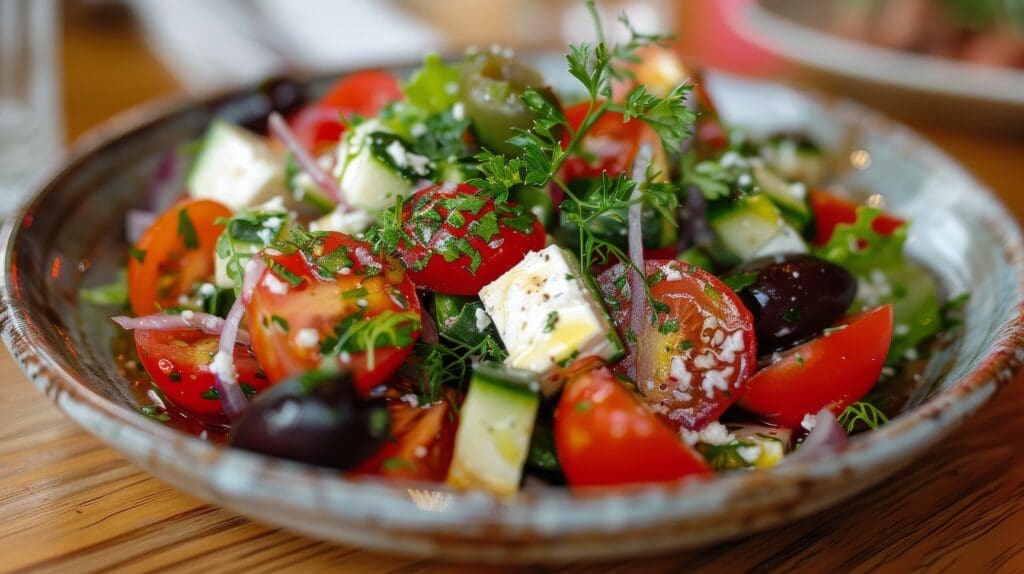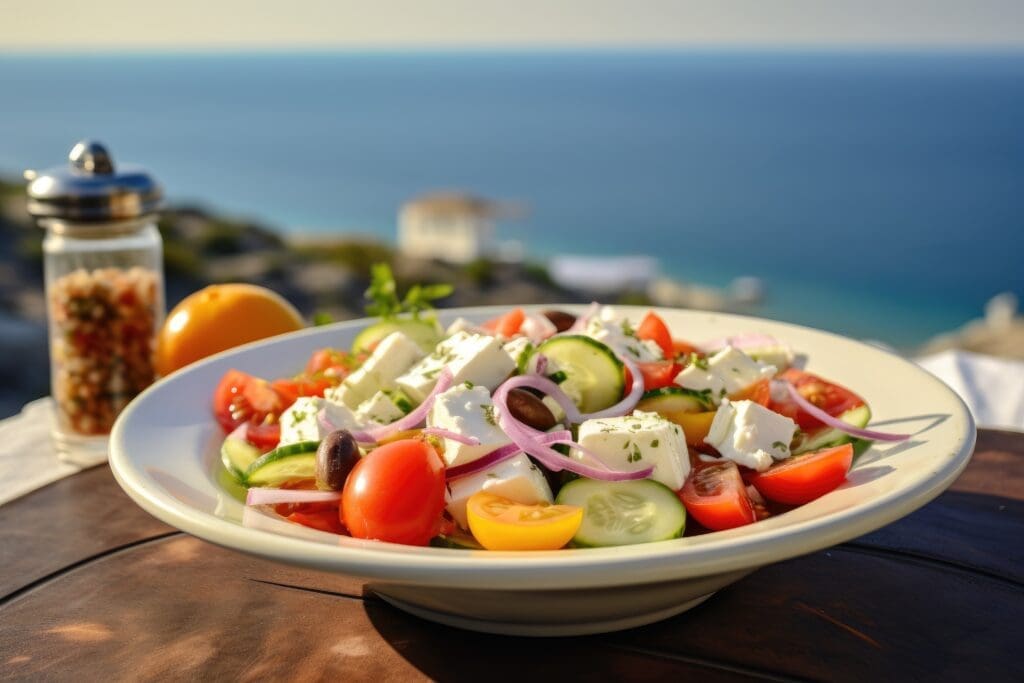
The Mediterranean Diet
The Mediterranean Diet: A Friendly Guide to Health, Simplicity, and Flavour
Hello there! If you’re looking to make a positive change in your diet that’s not only healthy but also simple to prepare and delicious, the Mediterranean diet might just be what you need. Imagine a way of eating that brings the sunny, vibrant flavors of the Mediterranean region to your table, all while supporting your overall health and well-being. Let’s dive into why this diet is so beneficial for your body, how easy it is to incorporate into your daily life, and the delightful flavors you can look forward to.
What is the Mediterranean Diet?
The Mediterranean diet is inspired by the traditional eating habits of people living in countries around the Mediterranean Sea, such as Greece, Italy, and Spain. It’s not a strict meal plan but rather a lifestyle choice that emphasizes:
- Fruits and Vegetables: The diet is rich in a variety of colorful and seasonal produce.
- Whole Grains: Whole-wheat bread, brown rice, and oats are preferred over refined grains.
- Healthy Fats: Olive oil is the go-to fat, with nuts and seeds also playing a significant role.
- Lean Proteins: Fish and poultry are the main sources of protein, with limited red meat.
- Legumes and Nuts: Beans, lentils, and a variety of nuts are staples.
- Dairy: Cheese and yogurt are enjoyed in moderation.
- Herbs and Spices: Fresh herbs and spices are used to flavor foods naturally.
- Red Wine: Consumed in moderation, typically with meals.
Health Benefits of the Mediterranean Diet
Let’s explore the incredible health benefits you can enjoy by adopting the Mediterranean diet.
1. Heart Health
Heart disease is a major concern for many, but the Mediterranean diet has been shown to significantly reduce this risk. The diet’s high content of monounsaturated fats, particularly from olive oil, and omega-3 fatty acids from fish helps lower bad cholesterol levels (LDL) and maintain good cholesterol levels (HDL). This combination supports healthy blood vessels and reduces the risk of heart attacks and strokes.
Tip: Try to include fatty fish like salmon or sardines in your meals twice a week. They’re not only good for your heart but also delicious!
2. Weight Management
Maintaining a healthy weight is crucial for overall health, and the Mediterranean diet excels in this area. Its focus on whole, unprocessed foods, and high fiber content from fruits, vegetables, and whole grains help you feel full and satisfied, reducing the temptation to overeat. Plus, the diet encourages balanced meals that provide sustained energy throughout the day.
Tip: Swap out your usual snacks for a handful of nuts or a piece of fruit. These options are not only tasty but will keep you full longer.
3. Diabetes Prevention and Management
If you’re concerned about blood sugar levels, the Mediterranean diet can be a powerful ally. The emphasis on low-glycemic foods, such as whole grains and legumes, helps to stabilize blood sugar levels. Additionally, the high fiber content slows the absorption of sugar, preventing spikes in blood glucose.
Tip: Incorporate beans and lentils into your salads and soups. They’re versatile, nutritious, and great for blood sugar control.
4. Cancer Risk Reduction
The antioxidants found in the abundant fruits, vegetables, nuts, and olive oil of the Mediterranean diet play a significant role in protecting your cells from damage and reducing inflammation, both of which are linked to cancer development. Specific foods, like tomatoes rich in lycopene and cruciferous vegetables, are particularly beneficial.
Tip: Enjoy a variety of colorful vegetables daily. Each color represents different antioxidants and nutrients that protect your health.
5. Brain Health
The Mediterranean diet supports brain health and may reduce the risk of cognitive decline and Alzheimer’s disease. The healthy fats, particularly omega-3 fatty acids, along with a wealth of antioxidants and anti-inflammatory compounds, are crucial for maintaining brain function and preventing age-related cognitive issues.
Tip: Include walnuts and fish in your diet regularly to keep your brain sharp and healthy.
6. Longevity
One of the most compelling benefits of the Mediterranean diet is its association with a longer, healthier life. The diet’s balanced and nutrient-rich approach helps to prevent many chronic diseases, contributing to increased longevity and improved quality of life.
Tip: Make small, consistent changes towards a Mediterranean eating pattern. Over time, these will add up to significant health benefits.

Simplicity in Preparation
Now, let’s talk about how easy it is to prepare meals following the Mediterranean diet. One of its greatest strengths is the simplicity and accessibility of its foods.
1. Minimal Processing
The Mediterranean diet emphasizes whole, minimally processed foods. Fresh fruits, vegetables, and whole grains require little more than basic preparation—washing, chopping, and maybe a quick sauté or roast.
Tip: Keep your meals simple. A fresh salad, a piece of grilled fish, and a side of roasted vegetables can be both easy to prepare and delicious.
2. One-Pot Meals
Meals like Mediterranean stews, ratatouille, and paella combine various food groups into one pot, making preparation and cleanup a breeze. These dishes often taste even better as leftovers, making them perfect for meal prep.
Tip: Invest in a good quality pot or Dutch oven. It’ll become your best friend for making nutritious one-pot meals.
3. Quick Grilling and Baking
Grilling fish or chicken with a drizzle of olive oil and a sprinkle of herbs takes just minutes but yields flavorful and healthy results. Baking vegetables or preparing a sheet pan dinner also requires minimal effort and is incredibly satisfying.
Tip: Keep your pantry stocked with essential spices and herbs like oregano, rosemary, and basil. They’ll add lots of flavor to your dishes without much fuss.
4. Effortless Salads
A traditional Greek salad with tomatoes, cucumbers, olives, and feta cheese can be assembled in minutes. Adding a handful of nuts or a piece of grilled fish transforms it into a complete meal that’s both nutritious and delicious.
Tip: Always have a variety of fresh veggies on hand. They make it easy to throw together a quick and healthy salad.
Flavorful and Enjoyable Eating
One of the common misconceptions about healthy eating is that it’s bland. The Mediterranean diet, however, is anything but. Here’s why it’s so flavorful and enjoyable:
1. Herbs and Spices
The generous use of herbs and spices, such as basil, oregano, rosemary, and garlic, enhances the natural flavors of food without the need for excessive salt. These ingredients not only make meals tasty but also offer additional health benefits.
Tip: Experiment with different herbs and spices to find combinations you love. Fresh herbs can make a big difference in your cooking.
2. Fresh Ingredients
Using fresh, seasonal produce ensures that meals are bursting with flavor. The natural taste of ripe tomatoes, crisp cucumbers, and fragrant herbs forms the foundation of Mediterranean cuisine.
Tip: Visit local farmers’ markets to get the freshest produce. Fresh ingredients can really elevate your meals.
3. Healthy Fats
Olive oil, a staple in the Mediterranean diet, adds a rich, smooth flavor to dishes. It’s used in dressings, marinades, and for drizzling over cooked vegetables and proteins.
Tip: Use extra virgin olive oil for the best flavor and health benefits. A little drizzle can go a long way.
4. Cultural Variety
The Mediterranean region encompasses diverse culinary traditions from countries like Greece, Italy, Spain, and Turkey. This variety allows for a wide range of flavors and dishes, keeping the diet exciting and pleasurable.
Tip: Explore recipes from different Mediterranean countries. Each offers unique and delicious dishes that you’ll love.
Practical Tips for Adopting the Mediterranean Diet
Ready to get started? Here are some practical tips to help you transition to the Mediterranean diet smoothly:
1. Start with Small Changes
You don’t have to overhaul your entire diet overnight. Begin by incorporating more fruits and vegetables into your meals, and gradually replace butter with olive oil and refined grains with whole grains.
Tip: Make one small change each week. This approach makes it easier to stick with your new eating habits.
2. Plan Your Meals
Planning meals ahead of time ensures that you have the necessary ingredients on hand and helps you avoid unhealthy last-minute choices. Focus on simple recipes that highlight fresh, whole foods.
Tip: Spend a few minutes each weekend planning your meals for the week. This will save you time and stress.
3. Stock Your Pantry
Keep a well-stocked pantry with staples like olive oil, canned tomatoes, beans, whole grains, and herbs. Having these ingredients readily available makes it easier to prepare Mediterranean-inspired meals.
Tip: Make a list of essential pantry items and stock up on them. This way, you’ll always have what you need to make a healthy meal.
4. Experiment with Recipes
Explore traditional Mediterranean recipes to discover new flavors and cooking techniques. Dishes like Greek moussaka, Italian minestrone, and Spanish gazpacho offer delicious ways to enjoy healthy ingredients.
Tip: Try cooking one new Mediterranean dish each week. It’s a fun way to expand your culinary repertoire and enjoy different flavors.
5. Enjoy Moderate Portions
The Mediterranean diet encourages moderation rather than restriction. Savor your meals, eat slowly, and listen to your body’s hunger and fullness cues.
Tip: Practice mindful eating. Pay attention to your food, enjoy every bite, and stop eating when you’re satisfied.

Sample Mediterranean Diet Meal Plan
The Mediterranean Diet: A Friendly Guide to Health, Simplicity, and Flavor
Breakfast:
- Greek yogurt with fresh berries, a drizzle of honey, and a handful of nuts.
- Whole grain toast with avocado, a poached egg, and a sprinkle of chili flakes.
Lunch:
- Quinoa salad with cherry tomatoes, cucumbers, red onion, feta cheese, and a lemon-olive oil dressing.
- A side of hummus with carrot and celery sticks.
Dinner:
- Grilled salmon with a side of roasted vegetables (zucchini, bell peppers, and eggplant) drizzled with olive oil and herbs.
- A small mixed greens salad with olives and a balsamic vinaigrette.
Snacks:
- Fresh fruit (apple, orange, or grapes).
- A small handful of almonds or walnuts.
- Whole grain crackers with a slice of cheese.
Conclusion
The Mediterranean diet is more than just a way of eating; it’s a lifestyle that emphasizes the enjoyment of wholesome, flavourful foods while promoting optimal health. Its simplicity in preparation and richness in taste make it an accessible and sustainable dietary choice. By adopting the Mediterranean diet, you can benefit from improved heart health, better weight management, reduced risks of chronic diseases, and enhanced overall well-being. So, embrace the flavours, enjoy the simplicity, and embark on a journey towards a healthier, happier life with the Mediterranean diet. You can also find tips on how to stock for a certain diet here.
Remember, it’s not about perfection but about making better choices that you can stick with long-term. More info about this type if diet can be found here.
